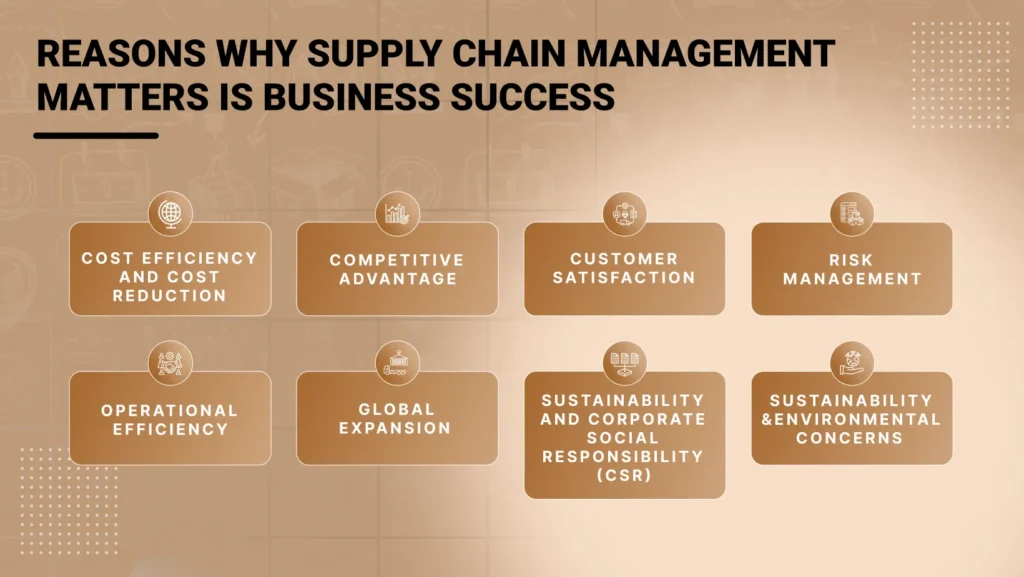Supply chain management is defined as: “The process of modelling how the supply chain will operate in its environment to meet the objectives of an organization’s business and organizational strategies.” In supply chain management, the materials, information, and finances associated with a product or service from purchase to distribution flow are actively digested. This approach focuses on improving efficiency for improve efficiency, reducing costs, and increasing customer satisfaction, while also being agile enough to adapt to market or industry changes It emphasizes not only operational aspects but also strategic with company products aligning and ensuring performance goals and objectives
Grasping the relevance of supply chain management requires knowing its vital terms. Beware, though, as some might mistake it for logistics management, but they’re separate ideas. Every business yearns for success and competition drives this desire.
This is where supply chain management steps in, its role being to evaluate how businesses’ offerings compare in value to the competition — a necessary task.
In this article, we’ll explore how supply chain management impacts business success, also known as cost efficiency and cost reduction, competitive advantage, customer satisfaction, risk management, and many more.
Reasons why Supply Chain management matters is business success
Cost Efficiency and Cost Reduction
Supply chain management helps to reduce material costs. This is done through agreements with supply chain members. However, this eliminates the costs associated with finding suppliers, contract negotiations, and seasonal orders. Additionally, awarding long-term contracts to supply chain members often results in substantial cost savings for the company. On top of this, a one-off contract has been fixed for a fixed period and thus protects the company from price fluctuations. Having an efficient supply chain allows companies to reduce the costs associated with the supply chain. Furthermore, this cost reduction increases the profitability of the business and can provide more cash to reinvest in the business.
The benefits of an efficient supply chain are evident. A top-notch supply chain boosts efficiency, handles risk, enhances transparency, better customer service, and cuts costs. With all parts of the supply chain flowing smoothly, businesses make sure their goods arrive when they should, in the amount they should. This leads to happy customers and increases the amount of money rolling in.
Competitive Advantage
Today’s fierce race calls for innovation. The class on Logistics and Supply Chain Management gives a fresh outlook. It shows how technologies like blockchain, AI, and IoT can boost efficiency in supply chains. Smaller ventures using these technologies have an edge. A good supply chain lets businesses outshine rivals. They do this by showcasing clear visibility and transparency, and smoothly keeping track of their supply chains.
Customer Satisfaction
Customer satisfaction has a direct impact on logistics and supply chain efficiency. Additionally, loyalty is greatly enhanced by on-time delivery, precise order tracking and outstanding products. The SCM program focuses on customer-centric approaches, teaching students to identify customer preferences, develop flexible supply chains, and provide great service, an important differentiator for small businesses competing in the marketplace.
Risk Management
Supply disruption can have far-reaching consequences, from delivery delays to reputational damage. However, companies need to proactively identify potential risks in their supply chains and develop plans to mitigate them. Moreover, prediction can be achieved by diversifying suppliers to reduce reliance on this single source, investing in redundant infrastructure to ensure business continuity, or by evaluation used to manage the process of problems.
Operational Efficiency
Productivity means getting more done with less. A top-notch supply chain is crucial for smooth operations. Consequently, for higher productivity, businesses should simplify processes, eliminate roadblocks, and embrace automation. Supply chain analytics add value too. They throw light on vital metrics like cycle time inventory turnovers and order fulfilment rates. This data can highlight areas that need attention to boost efficiency.
Global Expansion
Stepping into a new market, or growing into an existing one, brings several hurdles. From complying with rules to tweaking your product or service to suit local needs. Conquering these calls for fine-tuning your supply chain for a slick growth strategy. Consequently, this involves fostering ties with local suppliers or distributors, pouring resources into structures that back global logistics, and wielding robust tracking tools. These tools assist in performance tracking across various locations.
Sustainability and Corporate Social Responsibility (CSR)
Nowadays, the focus on sustainability and the company’s awareness of social duties (CSR) ranks high due to the growing eco-awareness. Holding it all together sits supply chain management (SCM), with responsibilities ranging from fair sourcing to green packaging and transportation. Pumping up sustainability all through the supply chain lets businesses cut down their harm to nature, boost their brand face, and draw in customers who care more about the community.
Conclusion
In conclusion, supply chain tests change the supply chain sector. It provides real-time visibility into your operations and allows you to communicate with stakeholders.
However, the two most important goals for a supply chain management company are to get things to the right place promptly and to receive alerts in real-time. So, by building cross-platform apps, our company gives users access to features and capabilities that improve productivity, improve communication, and enhance the user experience. We will partner with one of the world’s leading Cross platform mobile application development services companies to find innovative solutions and build relationships based on trust and shared goals.
FAQs
What is supply chain management (SCM), and why is it important for businesses?
Think of supply chain management as the playbook of a business. It’s how they plan, orchestrate, and streamline all the steps involved in getting goods and services. However, from sourcing materials, buying them, making products, and getting them to customers. It’s crucial for businesses! It helps them work efficiently, cut costs, keep customers happy, and stay competitive in the market.
How does supply chain management contribute to cost efficiency and cost reduction?
Handling the supply chain well assist companies in finding ways to cut costs. It does so by refining procedures, trimming the excess, securing good deals with suppliers, and making logistics operations more efficient. When costs in the supply chain drop, companies become more profitable and compete better.
What role does supply chain management play in gaining a competitive advantage?
It shows how technologies like blockchain, AI, and IoT can boost efficiency in supply chains. Smaller ventures using these technologies have an edge.
A well-managed supply chain enables businesses to differentiate themselves from competitors by offering visibility, and transparency, and tracking their supply chains more easily.
What is the relationship between supply chain management and sustainability/CSR?
Managing supplies matters a lot for making businesses sustainable and socially responsible. When a company practices eco-friendly sourcing, cuts down on carbon in shipping and distribution, and guarantees fair workplaces, it shows it cares about the environment and society. Additionally, this boosts its brand image and makes it a hit with consumers who value these things.
What are some common risks associated with supply chain management, and how can they be mitigated?
Typical dangers involve interruptions from natural disasters, actions on the world stage, problems with suppliers, and changes in demand. One can lessen these perils by actively preparing. Therefore, this includes having different suppliers, and contingency plans in place, using technology to see into the supply chain, and creating sturdy networks that can shift as needed.







